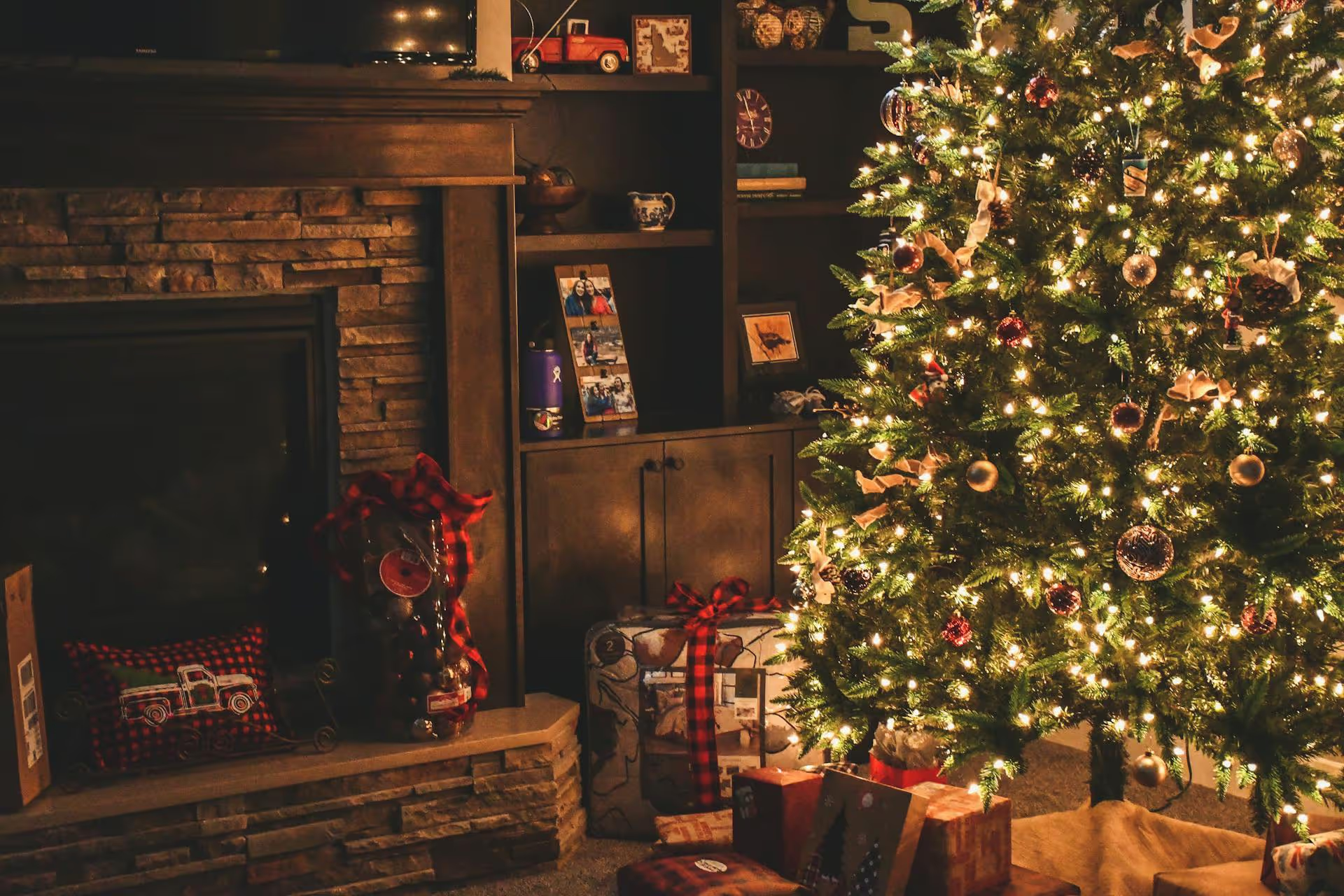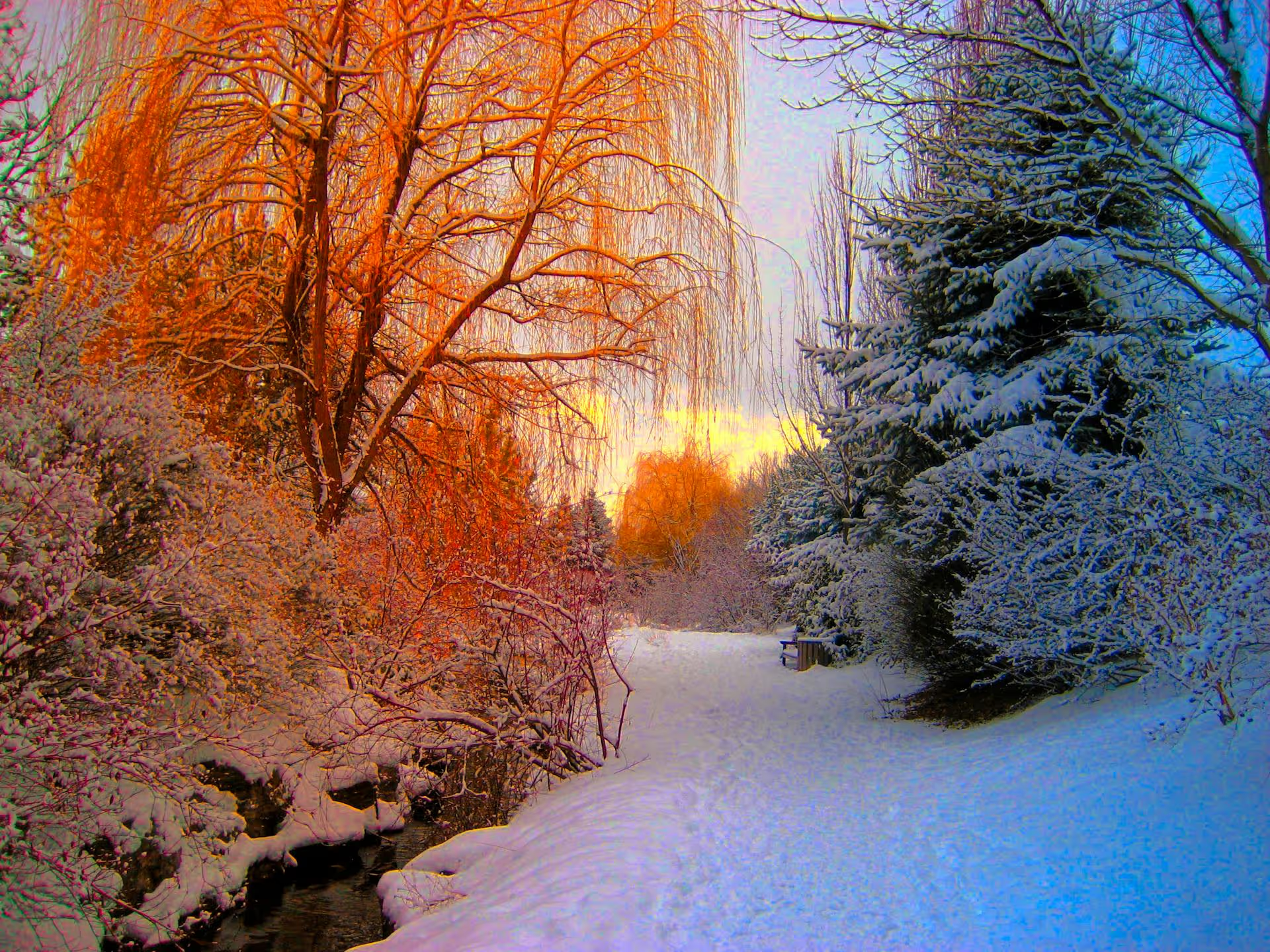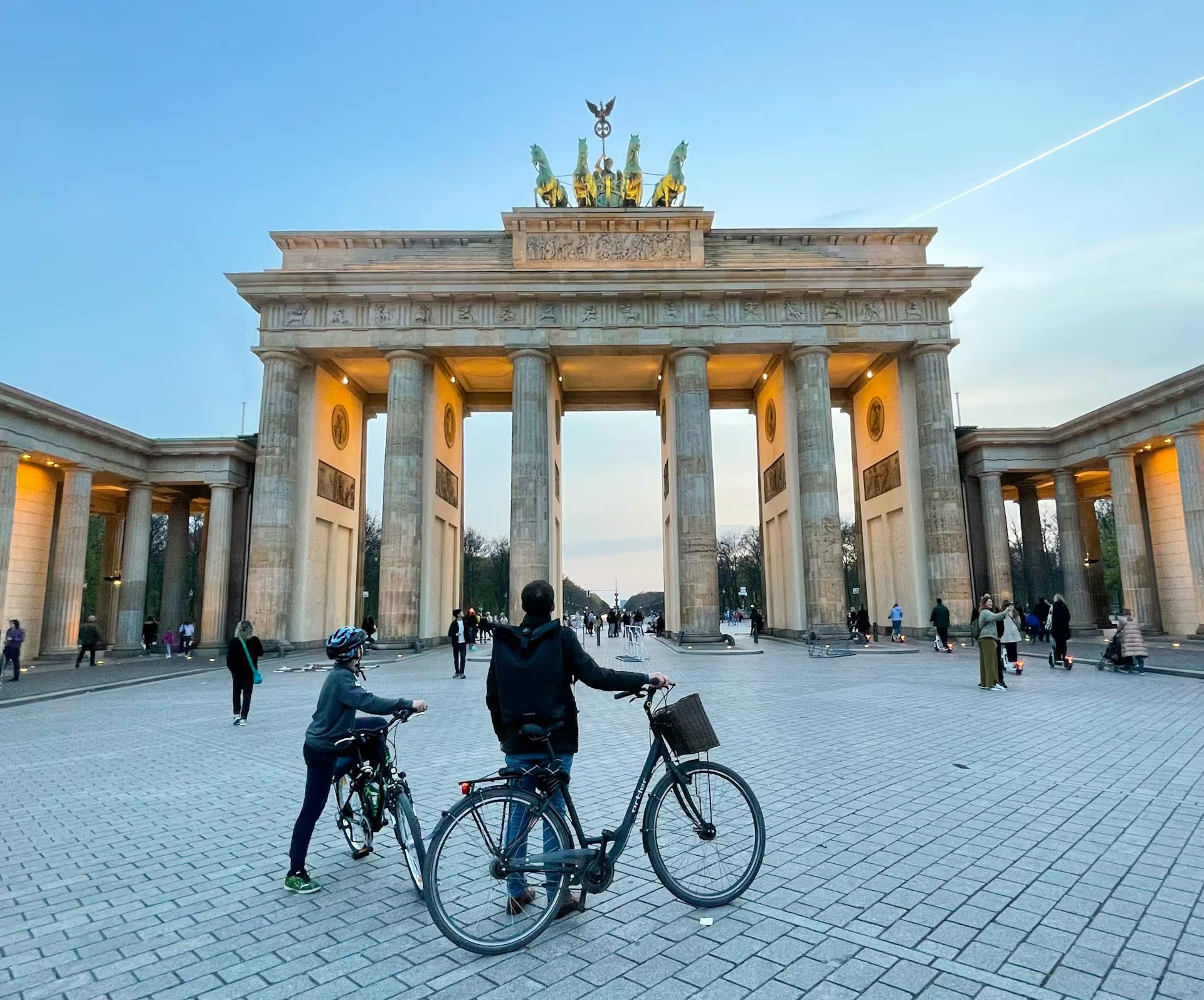
Рождество в Германии - это волшебное событие, наполненное богатыми традициями, оживленными рождественскими базарами и душевными блюдами. Давайте узнаем, как обычно празднуют Рождество, в чем смысл сезона Адвента и какое значение имеют рождественские рынки в Германии.
Немецкие рождественские традиции и обычаи
В немецкой культуре главным днем празднования Рождества является Сочельник, также известный как "Хайлигабенд". В течение дня магазины и большинство предприятий работают только до полудня или раннего вечера.
Вечером 24 декабря семьи собираются вместе на праздничный ужин с традиционными немецкими рождественскими блюдами и большим количеством тепла и единения.
Некоторые семьи устанавливают и украшают рождественскую елку вместе в "Хайлигабенд", в то время как другие обычно делают это за несколько дней до него. Рождественская елка ("Танненбаум") - ключевая часть этого вечера.
Это связано с тем, что обмен подарками у рождественской елки обычно является главным событием кануна Рождества. Традиционно в этот момент немецкие семьи вместе поют немецкие рождественские песни. Среди популярных рождественских песен - "Kling Glöckchen", "O Tannenbaum" и "Stille Nacht".
Рождество и Боксерский день в Германии
25 и 26 декабря являются государственными праздниками и также известны как Первый и Второй день Рождества ("erster und zweiter Weihnachtstag").
Первый день Рождества (25-е) часто является продолжением праздничной атмосферы Хайлигабенда и позволяет провести время в кругу семьи. Обычно семьи вместе наслаждаются большим завтраком. Кроме того, религиозные семьи в этот день посещают специальную рождественскую церковную службу.
На второе Рождество (26-е) магазины остаются закрытыми, а семейное времяпрепровождение продолжается. Как правило, немцы посещают разные части семьи в оба дня, если они провели Хайлигабенд только с непосредственными членами семьи.
Традиции сезона Адвента в Германии

Сезон Адвента ("Adventszeit") знаменует собой начало рождественского отсчета. Обычно он проходит за четыре недели до Рождества.
Один из самых знаковых символов сезона Адвента - адвентский венок, также известный как "адвентскранц". В венке четыре свечи, и в каждое воскресенье Адвента зажигается новая свеча. Первая свеча зажигается в первое воскресенье, вторая - во второе, и так далее.
Адвент-календари также являются ключевой частью традиции сезона Адвента. Адвент-календарь ("Adventskalender") обычно состоит из 24 маленьких дверок, которые отсчитывают время от 1 декабря до Хайлигабенда.
Каждый день до кануна Рождества принято открывать по одной дверце. В большинстве адвент-календарей за каждой дверцей находится сладкое угощение, например, шоколад. В современных календарях также есть игрушки, игры или закуски.
Немецкие рождественские рынки
Невозможно говорить о Рождестве в Германии, не упоминая об очаровательных рождественских рынках. Рождественские рынки для многих становятся главным событием праздничного сезона благодаря праздничной атмосфере.
В большинстве, если не во всех, немецких городах и поселках с конца ноября до Хайлигабенда или даже Нового года работает рождественский рынок ("Weihnachtsmarkt").
Города оживают и становятся похожими на зимние страны чудес с множеством мерцающих огней и красочных украшений. В воздухе витает аромат жареных орехов, глинтвейна ("Glühwein") и традиционных праздничных угощений.
При посещении рождественского рынка в Германии вы также можете найти киоски, торгующие товарами ручной работы, такими как деревянные украшения, игрушки и текстиль. Это также делает рождественский рынок идеальным местом для покупки особенных подарков для друзей или семьи.
Кроме того, рождественские рынки предлагают целый ряд развлечений и мероприятий, например, выступления местных хоров и музыкантов или катание на каруселях. В некоторых городах вы также найдете ледовые катки или колеса обозрения.
Лучшие рождественские рынки Германии
Каждый рождественский рынок в Германии обладает своим неповторимым характером и очарованием. Хотя выбор "лучшего" рождественского рынка зависит от личных предпочтений, есть несколько, которые завоевали сердца многих:
- Рождественский рынок в Нюрнберге
- Выставка Weihnachtsmarkt am Kölner Dom в Кельне
- Рождественский рынок в Мюнхене
- Штризельмаркт в Дрездене
- Франкфуртская ярмарка на Рёмере во Франкфурте
- Штерншнуппенмаркт в Висбадене
Как провести рождественский сезон в Германии
Проведение праздничного сезона в новой и более холодной обстановке может показаться скорее сложным, чем увлекательным, особенно если в вашей родной стране в это время года обычно теплее.
Однако в разгар празднеств появляется уникальная возможность по-настоящему погрузиться в немецкие рождественские традиции. Вот несколько советов, которые помогут вам адаптироваться и по-настоящему насладиться волшебным Рождеством в Германии:
- Посетите рождественские рынки. Это один из лучших способов попробовать типичные немецкие рождественские закуски и напитки. Рождественские рынки также оживляют праздничный сезон сказочными огнями, украшениями и благоухающими ароматами.
- Организуйте обмен "Тайным Сантой" с друзьями. Это усилит праздничное настроение в вашей дружеской компании, а также сблизит вас в этот сезон.
- Посетите рождественский праздник. Это может быть праздник, организованный друзьями, университетом или даже городом. Кроме того, вы можете устроить рождественскую вечеринку со своими иностранными друзьями и поделиться своими праздничными традициями.
- Купите адвент-календарь. Он поможет вам каждый день с воодушевлением вести обратный отсчет до Рождества. Ваш адвент-календарь не обязательно должен быть шоколадным. Вы можете найти календарь с продуктами по уходу за кожей, алкоголем и многим другим.
- Попробуйте заняться зимними видами спорта. Возможно, вам не хочется проводить время на улице в холод, но такие виды спорта, как катание на коньках, - отличный способ приобщиться к сезонной красоте.
Вопросы и ответы
Найдите ответы на распространенные вопросы о жизни в Германии.
Почему Германия славится Рождеством?
Германия славится Рождеством, потому что многие популярные сегодня традиции, такие как рождественская елка, адвент-календари и рождественские рынки, зародились именно здесь. Глубоко укоренившиеся обычаи, праздничные блюда и исторические рынки этой страны определили то, как празднуют Рождество не только в Европе, но и во всем мире.
Какой город в Германии лучше всего посетить на Рождество?
Это зависит от того, что вы ищете. Нюрнберг знаменит на весь мир своим Рождественским рынком, а в Кельне на фоне собора расположены потрясающие рынки. Штризельмаркт в Дрездене - один из старейших в Германии, а в Мюнхене царит оживленная праздничная атмосфера с множеством баварских традиций. Каждый город привносит свой неповторимый шарм.
Куда поехать в Германии на белое Рождество?
Если вы надеетесь на снег, отправляйтесь в Баварские Альпы, Шварцвальд или высокогорные города вроде Гармиш-Партенкирхена. В этих регионах больше всего шансов встретить настоящее белое Рождество. Даже если снег не выпадет, зимние пейзажи и праздничные традиции все равно сделают это время года волшебным.
Куда лучше всего поехать в Германии на Рождество?
Куда лучше всего поехать, зависит от того, предпочитаете ли вы большие праздничные города или маленькие сказочные городки. В таких городах, как Кельн, Мюнхен и Берлин, можно посетить оживленные рождественские базары и мероприятия, а в небольших городках, таких как Ротенбург-на-Таубере или Гейдельберг, вас ждет более интимная и живописная рождественская атмосфера.
Какой город в Германии самый рождественский?
Многие путешественники считают Нюрнберг самым рождественским городом из-за его всемирно известного Христорождественского рынка. Однако Дрезден, Кельн и Ротенбург-на-Таубере также являются сильными соперниками благодаря своим украшениям, традициям и волшебной зимней атмосфере.
Как в Германии называют Санта-Клауса?
В Германии Санта-Клауса часто называют "Weihnachtsmann" (рождественский человек). В некоторых регионах дети получают подарки от Christkind (Младенца Христа), в то время как в других центральную роль в декабрьских традициях играет Святой Николай ("Sankt Nikolaus"). Точная цифра варьируется в зависимости от региона.
Как в Германии называют Рождество?
На немецком языке Рождество называется "Weihnachten", что напрямую переводится как "святая ночь". Это слово отражает религиозное и культурное значение праздника, и вы часто услышите его в таких приветствиях, как "Frohe Weihnachten!". (Счастливого Рождества!).
Является ли Германия хорошим местом для проведения Рождества?
Да, Германия - одно из лучших мест в мире для проведения Рождества. Страна славится своими рождественскими рынками, праздничными традициями, сытной сезонной едой и уютной зимней атмосферой. Где бы вы ни побывали - в большом городе, таком как Берлин или Мюнхен, или в маленьком городке со средневековым шармом, - дух праздника витает повсюду.
Рождество в Германии отмечается 24 или 25 числа?
В Германии главный праздник приходится на 24 декабря (Heiligabend). Семьи обычно собираются вечером, чтобы поужинать, украсить елку и обменяться подарками. 25 и 26 декабря, известные как Первый и Второй рождественские дни, - это праздничные дни, которые принято проводить в кругу семьи, отдыхая и наслаждаясь праздничными блюдами.
Рождество - хорошее время для поездки в Германию?
Безусловно! Рождество - одно из самых волшебных времен для посещения Германии. Хотя может быть холодно, праздничные огни, рынки и традиционные блюда создают незабываемое впечатление. Это также возможность насладиться культурными традициями, такими как глинтвейн, лебкухен и празднование Адвента.
Как в Германии празднуют Рождество?
Рождество в Германии отмечается с упором на семью, традиции и праздничные посиделки. Главный день - канун Рождества (Heiligabend), когда семьи украшают елку, обмениваются подарками и наслаждаются праздничным ужином. Очень важен и сезон Адвента, который предшествует Рождеству: календари Адвента, венки и рождественские рынки добавляют радости.
Получите пакет документов для получения визы
Начните свое путешествие в Германию с помощью нашего комплексного решения по оформлению виз, учитывающего все ваши потребности.
Подробнее о жизни в Германии
От сезонных погодных условий до праздничных традиций - все, что вам нужно знать о жизни в Германии




